Related Research Articles

The Kikuyu are a Bantu ethnic group native to East Africa Central Kenya. At a population of 8,148,668 as of 2019, they account for 17.13% of the total population of Kenya, making them Kenya's largest ethnic group.
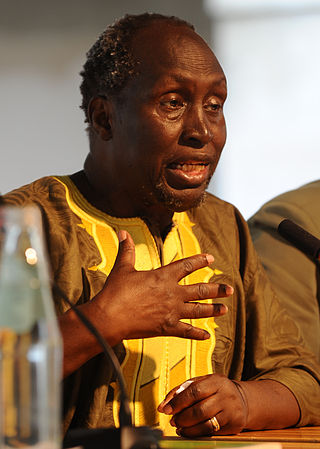
Ngũgĩ wa Thiong'o is a Kenyan author and academic, who has been described as "East Africa's leading novelist". He began writing in English, switching to write primarily in Gikuyu. His work includes novels, plays, short stories, and essays, ranging from literary and social criticism to children's literature. He is the founder and editor of the Gikuyu-language journal Mũtĩiri. His short story The Upright Revolution: Or Why Humans Walk Upright has been translated into 100 languages.
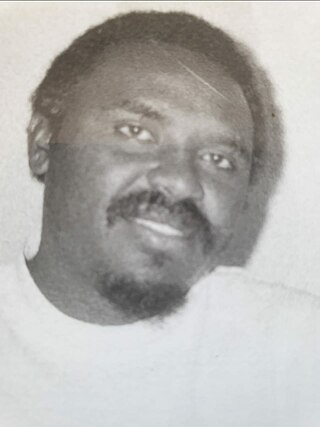
Ngũgĩ wa Mirii was a Kenyan-Zimbabwean playwright, social worker and teacher, most known for his play Ngaahika Ndeenda, which he co-authored with fellow Gikuyu writer Ngũgĩ wa Thiong'o. The play depicts the injustices and excesses of post-colonial Kenya, and was staged by non-intellectuals in an open-air theatre at the Kamirithu Educational and Cultural Center in Limuru.
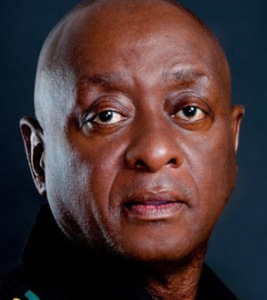
Mbongeni Ngema was a South African playwright, lyricist, composer, director, choreographer, and theatre producer, best known for co-writing the 1981 play Woza Albert! and co-writing the 1988 musical Sarafina!. He was known for plays that reflected the spirit of black South Africans under apartheid, and won much praise for his work, but was also the subject of several controversies. He died in a car accident on 27 December 2023.

The culture of Kenya consists of multiple traditions and trends without a single prominent culture identifying the country. Kenyan cultural heritage and modern expressions of culture instead consist of various cultures, shaped and practiced by the country's different communities.

Peter Nazareth is a Ugandan literary critic and writer of fiction and drama.
Kamiti Maximum Security Prison is a prison in Nairobi, Kenya. The prison is within Kasarani District, bordering Kiambu County. Originally named "Kamiti Downs", it sits in the middle of its own 490-hectare (1,200-acre) estates which lie fallow and untended.
Mugo wa Kibiru or Chege (Cege) wa Kibiru was a Kenyan sage from the Gikuyu tribe who lived in the 18th and early 19th centuries. His name "Mugo" means "a healer". Mugo wa Kibiru was born in Kariara, Murang'a, near Thika, but his exact dates of birth and death are unknown.

Harry Thuku was a Kenyan born in Kiambu, Mitahato village. As a politician, he was one of the pioneers in the development of modern African nationalism in Kenya. He helped found the Young Kikuyu Association and the East African Association before being arrested and exiled from 1922 to 1931. In 1932 he became President of the Kikuyu Central Association, in 1935 founded the Kikuyu Provincial Association, and in 1944 founded the Kenya African Study Union. Opposed to the Mau Mau movement, he later retired to coffee-farming.
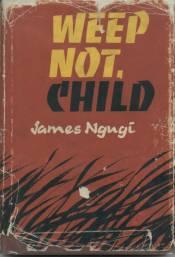
Weep Not, Child is a 1964 novel by Kenyan author Ngũgĩ wa Thiong'o. It was his first novel, published in 1964 under the name James Ngugi. It was among the African Writers Series. It was the first English language novel to be published by an East African. Thiong'o's works deal with the relationship between Africans and white settlers in colonial Kenya, and are heavily critical of colonial rule. Specifically, Weep Not, Child deals with the Mau Mau Uprising, and "the bewildering dispossession of an entire people from their ancestral land." Ngũgĩ wrote the novel while he was a student at Makerere University.

Petals of Blood is a novel written by Ngũgĩ wa Thiong'o and first published in 1977. Set in Kenya just after independence, the story follows four characters – Munira, Abdulla, Wanja, and Karega – whose lives are intertwined due to the Mau Mau rebellion. In order to escape city life, each retreats to the small, pastoral village of Ilmorog. As the novel progresses, the characters deal with the repercussions of the Mau Mau rebellion as well as with a new, rapidly westernizing Kenya.
Ngaahika Ndeenda is a controversial play that covers post-colonial themes of class struggle, poverty, gender, culture, religion, modernity vs. tradition, and marriage and family.
Kamirithu is a settlement in Kiambu County, within Kenya's former Central Province. It was one of the colonial villages established during the scramble for the Kenyan "White Highlands" in the early 1900s. Kamirithu is the home of Chief Kamiri and Chief Jairus. Kamirithu is best known from Ngugi wa Thiong'o's Kamirithu Educational and Cultural Center, which was an open-air theater where Ngaahika Ndeenda was first performed.

Mĩcere Gĩthae Mũgo was a Kenyan professor, playwright, author, activist and poet. She was a literary critic and professor of Literature, Creative Writing and Research Methods in the Department of African American Studies at Syracuse University. She was forced into exile in 1982 from Kenya during the Daniel Arap Moi dictatorship for activism and moved to teach in the United States, and later Zimbabwe. She taught Orature, Literature, and Creative Writing.
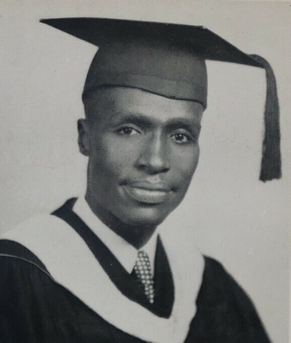
Reuel John Mugo Gatheru was a Kenyan writer known for his 1964 memoir, Child of Two Worlds, which describes his early life in Kenya and his education abroad.
The Black Hermit was the first play by the Kenyan author Ngũgĩ wa Thiongʼo, and the first published East African play in English. The travelling theatre of Makerere College was the first to produce the play, putting it on in honour of Ugandan independence at the Ugandan National Theatre in Kampala in November 1962. The play was published in a small edition by Makerere University Press in 1963, and republished in the Heinemann African Writers Series in 1968.
The Kamiriithu Community Education and Cultural Centre was an arts and education facility built in Kamiriithu, Kenya in 1976. Ngũgĩ wa Thiong'o spearheaded the project's creation, while scholars from the University of Nairobi and locals from the Kamiriithu village community supported the project as well. The centre was especially focused around theatre, through a multitude of self-contained programs geared towards different community groups. The participants came from a variety of different classes, but were predominantly made up of the local peasant class.

Decolonising the Mind: the Politics of Language in African Literature, by the Kenyan novelist and post-colonial theorist Ngũgĩ wa Thiong'o, is a collection of essays about language and its constructive role in national culture, history, and identity. The book, which advocates linguistic decolonization, is one of Ngũgĩ's best-known and most-cited non-fiction publications, helping to cement him as a preeminent voice theorizing the "language debate" in post-colonial studies.

The Fairmont Norfolk is a historic hotel in Nairobi, Kenya, and is managed by the luxury hotel chain Fairmont Hotels and Resorts. The hotel has 170 rooms and three restaurants, and consists of five main blocks, each ranging from 1 to 2 stories high. The hotel has a signature Tudor style of architecture that has been maintained since its original construction.
References
- ↑ "Ministry of State for National Heritage & Culture". Archived from the original on 2011-05-20. Retrieved 2009-11-19.
- ↑ "The Kenya National Theatre". kenyaculturalcentre.go.ke. Retrieved 2020-05-28.
- ↑ Nderitu, Alexander (2017-06-28). "Kenyan Theatre: The Good, The Bad and the Ugly". The Theatre Times. Retrieved 2024-08-24.
- ↑ Munene, Brian (2017-07-10). "The Kenya National Theatre | BUILDesign". BUILDesign. Retrieved 2018-03-22.
- ↑ November 08 2018, Thursday (2020-12-25). "Rise of Kenya National Theatre". Business Daily. Retrieved 2021-11-08.
{{cite web}}: CS1 maint: numeric names: authors list (link) - ↑ "Theatre Review: Jesus Christ Superstar". The Star, Kenya. Retrieved 2018-03-22.
- ↑ Nderitu, Alexander (2017-06-28). "Kenyan Theatre: The Good, The Bad and the Ugly". The Theatre Times. Retrieved 2024-08-24.